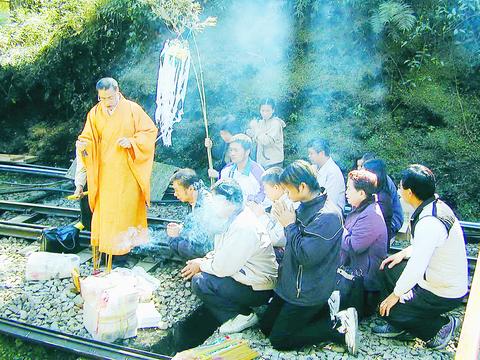Human error was the probable cause of the Alishan train accident on Saturday, Luo Chien-hsun (羅建勛), chief prosecutor of the Chiayi Prosecutors' Office, said yesterday.
Initial investigations showed that a stopcock which controlled the airbrake connection between the locomotive and the carriages had been inadvertently left closed.
The accident happened on Saturday afternoon when a four-carriage mountain train, packed with nearly 200 people, derailed shortly after leaving Alishan Railway Station. Seventeen people were killed.

PHOTO: YANG KUO-TANG, TAIPEI TIMES
The Council of Agriculture's Taiwan Forestry Bureau, which is responsible for the operation of the railway, said 156 people were injured.
"I have worked as a train driver for more than 20 years. It was the first time I met this kind of situation," the train's driver, Tsai Chen-sun (蔡振森), said yesterday.
"Three minutes after departing from Alishan Station, the train began traveling down a gradient. I felt clearly the train was speeding," Tsai said.
"I tried desperately to stop the train but the brakes failed. Then the train rammed into the mountain side," Tsai said.
Luo said the train brakes failed because the stopcock was closed.
"The two drivers and the conductor did not check the condition of the stopcock carefully before leaving Alishan Station," Luo said. "That's why the train's brakes failed when the train was traveling down the gradient."
Luo excluded the possibility that the train derailed because of overloading or track problems.
The Chiayi District Court refused a prosecutors' request to detain the two train drivers early yesterday morning. Nevertheless, Luo said the train's conductor and drivers would be sent before the court again on a charge of professional negligence.
Meanwhile, Huang Yu-hsing (黃裕星), director of COA's Forestry Bureau, held a press conference to respond to local media reports that the accident took place because the four-carriage train might be overloaded.
Some reports said that each carriage could only carry 25 passengers; therefore the capacity of the train should have only been 100 passengers whereas there were about 190 passengers aboard Saturday afternoon.
Huang said that the capacity of each carriage was in fact 40 seated and 10 standing passengers meaning that each train could carry 200 people.
There were certainly fewer than 200 aboard the train at the time of the accident, Huang said.
COA Chairman Lee Chin-lung (李金龍) apologized yesterday to the victims and their families and promised to increase the amount of compensation available.
"The family of each fatality can claim compensation as high as NT$7.1 million," Lee said. This compensation includes NT$4.1 million from the railway system's travel insurance and NT$2.4 million from the COA.
On top of this the COA will also give each family of a fatality NT$400,000 for a funeral and NT$200,000 condolence money.
The COA distributed yesterday a total of NT$8 million in compensation to families of the dead and the injured.
Moreover, Lee Jen-chyun (李健全), vice chairman of COA, said the operation of the railway will continue to be suspended until the cause of the tragedy is fully understood.
"The COA will also pay for every passenger's medical costs incurred in the accident," Lee said.
Also see story:

A magnitude 7.0 earthquake struck off Yilan at 11:05pm yesterday, the Central Weather Administration (CWA) said. The epicenter was located at sea, about 32.3km east of Yilan County Hall, at a depth of 72.8km, CWA data showed There were no immediate reports of damage. The intensity of the quake, which gauges the actual effect of a seismic event, measured 4 in Yilan County area on Taiwan’s seven-tier intensity scale, the data showed. It measured 4 in other parts of eastern, northern and central Taiwan as well as Tainan, and 3 in Kaohsiung and Pingtung County, and 2 in Lienchiang and Penghu counties and 1

A car bomb killed a senior Russian general in southern Moscow yesterday morning, the latest high-profile army figure to be blown up in a blast that came just hours after Russian and Ukrainian delegates held separate talks in Miami on a plan to end the war. Kyiv has not commented on the incident, but Russian investigators said they were probing whether the blast was “linked” to “Ukrainian special forces.” The attack was similar to other assassinations of generals and pro-war figures that have either been claimed, or are widely believed to have been orchestrated, by Ukraine. Russian Lieutenant General Fanil Sarvarov, 56, head

FOREIGN INTERFERENCE: Beijing would likely intensify public opinion warfare in next year’s local elections to prevent Lai from getting re-elected, the ‘Yomiuri Shimbun’ said Internal documents from a Chinese artificial intelligence (AI) company indicated that China has been using the technology to intervene in foreign elections, including propaganda targeting Taiwan’s local elections next year and presidential elections in 2028, a Japanese newspaper reported yesterday. The Institute of National Security of Vanderbilt University obtained nearly 400 pages of documents from GoLaxy, a company with ties to the Chinese government, and found evidence that it had apparently deployed sophisticated, AI-driven propaganda campaigns in Hong Kong and Taiwan to shape public opinion, the Yomiuri Shimbun reported. GoLaxy provides insights, situation analysis and public opinion-shaping technology by conducting network surveillance

‘POLITICAL GAME’: DPP lawmakers said the motion would not meet the legislative threshold needed, and accused the KMT and the TPP of trivializing the Constitution The Legislative Yuan yesterday approved a motion to initiate impeachment proceedings against President William Lai (賴清德), saying he had undermined Taiwan’s constitutional order and democracy. The motion was approved 61-50 by lawmakers from the main opposition Chinese Nationalist Party (KMT) and the smaller Taiwan People’s Party (TPP), who together hold a legislative majority. Under the motion, a roll call vote for impeachment would be held on May 19 next year, after various hearings are held and Lai is given the chance to defend himself. The move came after Lai on Monday last week did not promulgate an amendment passed by the legislature that